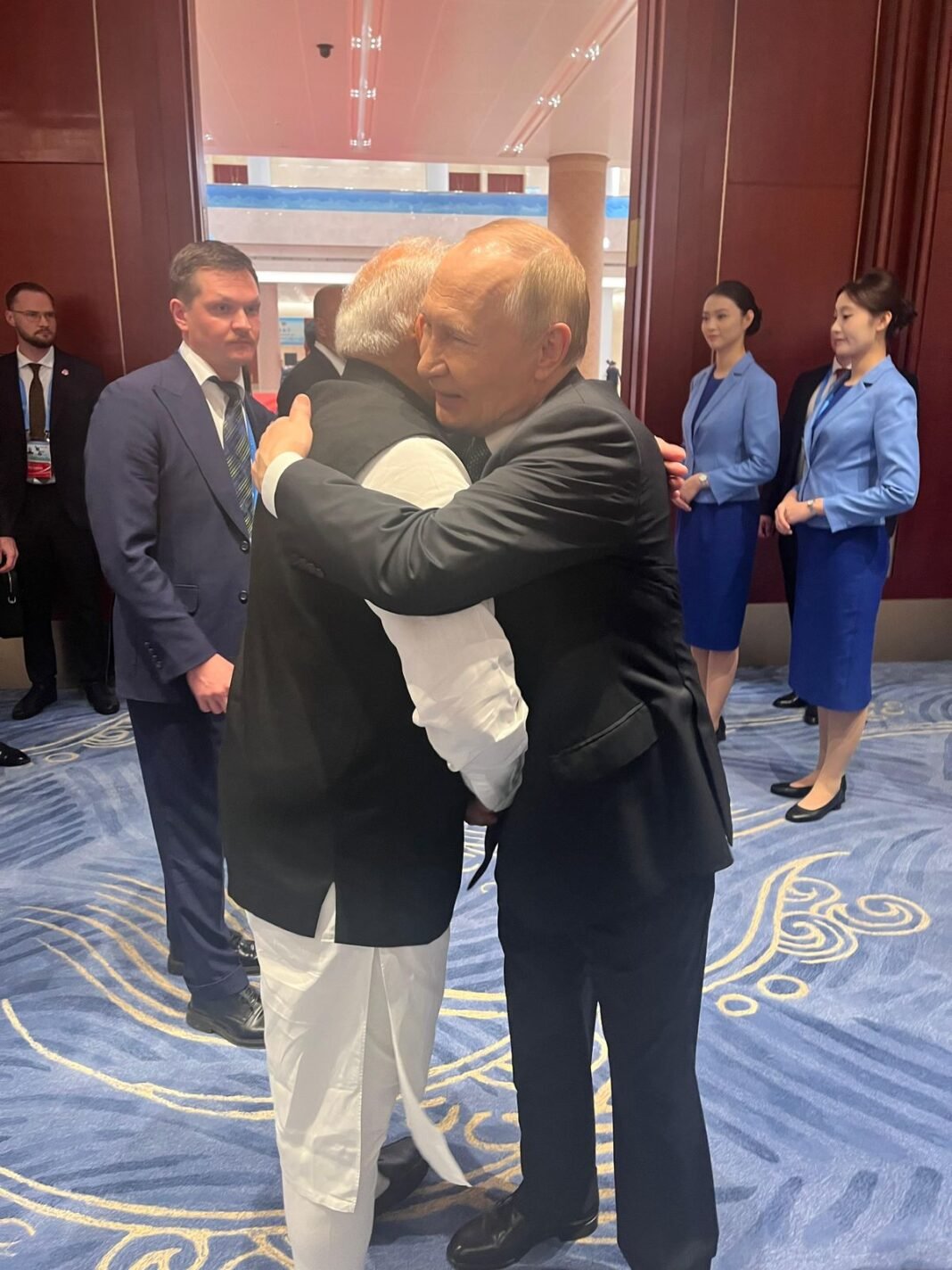Modi-Putin Bond on Display at SCO Summit
Prime Minister Narendra Modi and Russian President Vladimir Putin put their camaraderie on full display during their meeting on the sidelines of the Shanghai Cooperation Organization (SCO) summit in Tianjin, China. The two leaders warmly hugged upon greeting each other, a gesture that underscored the continuing depth of India-Russia relations despite the turbulence in global geopolitics. Later in the day, they were photographed sharing the backseat of a car, heading to their bilateral talks. The images, which Modi shared on social media, highlighted both the personal rapport and the strategic significance of the partnership. “Always a delight to meet President Putin,” Modi wrote, further adding that conversations with the Russian leader were always “insightful.”
Trump’s Tariff Salvo Shadows the Meeting
The meeting took place against the backdrop of newly imposed U.S. tariffs that have raised fresh tensions in India’s foreign trade. President Donald Trump announced a sweeping 50% duty on Indian imports, half of which were directly linked to New Delhi’s ongoing trade with Russia, particularly in energy. Trump and his administration have repeatedly criticized India for purchasing Russian oil, alleging that such revenue indirectly supports Moscow’s war effort in Ukraine. Trump’s trade adviser Peter Navarro went further, accusing India of undermining Washington’s efforts to squeeze Russia financially.
Always a delight to meet President Putin! pic.twitter.com/XtDSyWEmtw
— Narendra Modi (@narendramodi) September 1, 2025
India’s Energy Position and U.S. Pressure
India has maintained that its energy imports are guided by global market dynamics and national interest, not external pressure. New Delhi has consistently argued that affordable energy access is crucial for sustaining its growth and protecting consumers from inflationary shocks. Officials in the Modi government have reiterated that India will continue to buy energy from any country offering favorable terms. Yet, the Trump administration has indicated it could double down further, with threats of secondary sanctions looming over nations purchasing Russian oil.
Trump’s Previous Warnings to Russia
Only weeks before, Trump had issued an ultimatum to Moscow, threatening 100% tariffs if Russia failed to engage seriously in a peace process over Ukraine. He also hinted that secondary sanctions on Russian oil buyers would be “devastating.” In an interview with Fox News, Trump claimed that Russia had effectively “lost an oil client” in India, despite evidence that Indian purchases of Russian crude remained steady. “If I did secondary sanctions, it would be devastating from their standpoint,” Trump warned. His comments reflected Washington’s growing frustration with both Russia and countries that continue energy ties with Moscow.
Modi-Putin Partnership Despite Global Headwinds
For India, its longstanding relationship with Russia extends beyond oil. Defense cooperation, nuclear energy projects, and technology transfers remain core elements of the bilateral agenda. Modi’s meeting with Putin at Tianjin reaffirmed the resilience of this partnership, even as India continues to balance its strategic ties with the United States and other Western powers. Both leaders appeared at ease during their interaction, underscoring not only personal warmth but also institutional continuity in India-Russia relations.
Xi Jinping Hosts Summit in Tianjin
The SCO summit itself was significant for another reason: it marked Modi’s first visit to China in seven years, and his first encounter with Chinese President Xi Jinping in nearly twelve months. Xi welcomed both Modi and Putin, signaling Beijing’s interest in fostering cooperation among major Eurasian powers. The leaders’ last meeting in Kazan, Russia, in October had already set the stage for an easing of India-China tensions along the Line of Actual Control. The Tianjin summit now provides another opportunity for dialogue, with Modi emphasizing multilateralism and constructive engagement within the SCO framework.
Broader Implications for Global Geopolitics
The Modi-Putin embrace and their subsequent car ride may appear symbolic, yet the timing and setting carried wider geopolitical weight. As Trump tightens trade restrictions and presses allies to reduce ties with Russia, India’s decision to maintain its relationship with Moscow sends a clear signal of strategic autonomy. While this stance risks further friction with Washington, it aligns with New Delhi’s long-standing foreign policy principle of balancing multiple partnerships without becoming overly dependent on any single power bloc.








